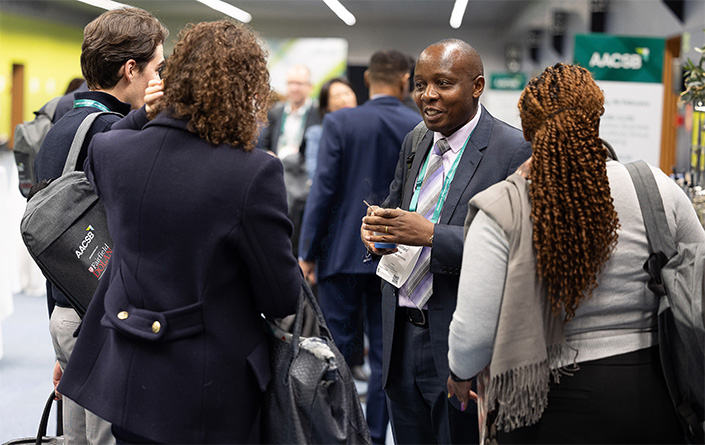Business Education Looks Toward Future Societal Impact
More than 650 representatives from over 350 organizations joined AACSB's first virtual International Conference and Annual Meeting (ICAM) to work on the challenges and opportunities facing business schools today. Two major themes emerged: societal impact and agile shifts to digital modalities.
Societal Impact
Business schools have responded to internal and external demands to become enablers of global prosperity in a big way. Societal impact has become an integral part of institutions' missions, program curriculum, and AACSB's proposed 2020 business accreditation standards. Creating positive societal impact is no longer just a marketing statement. It's part of business schools' strategies as well as a measure of their success.
Societal impact is a key part of the proposed 2020 business accreditation standards. Not only must it be represented at a high level in a school's mission, but it also must be part of a relevant, forward-looking curriculum that aligns with competency goals for learners. AACSB looks for, and learners demand, outcomes far beyond graduation. How are schools preparing graduates to lead responsibly? To engage with the community? To help solve real-world problems? The collective force of more than 850 accredited institutions tackling society's challenges is significant. Together we are committed to using business as a force for good.
Already, our network of business schools has stepped in to respond to problems created by the COVID-19 pandemic. Improving supply chains for food banks, assisting struggling small businesses through consulting and resources, and rethinking how we can teach and learn in safer and more accessible ways are just a few examples that were shared during the conference.
Digital Transformation
An unprecedented shift to online learning has defined the early part of 2020. The learner experience, central to the success of business schools, has and will continue to change. Business schools are adapting at an incredible pace. Learning isn't the only thing that has been moved online; academic advising, career services, and other engagement points for learners have all transitioned.
The most successful institutions, the ones that have transitioned quickly and with the least resistance, are the ones that have a clear and prominent set of leading statements of mission, vision, and values. In a session titled “Reflection at a Point of Inflection: Leading After COVID-19,” co-presenter Julie Perrin-Halot, associate dean at Grenoble Ecole de Management, commented, "In organizations where the mission is co-created, shared, and ingrained, that mission becomes the default mode in crisis because we see it through our leadership. So when we fall into default, we have the mission to support us."
We have seen many quick transitions to virtual environments, specifically among strong leadership teams that are guided by organizational values. Those values inform how we act and how we communicate to our stakeholders. So far, we've reacted. But the most agile institutions have begun to look at medium-term actions—those neither for the immediate future nor the long term, but for the transitional space in between. The last piece, the proactive piece, will be looking at our missions to see how we can use the crisis as a catalyst for lasting, positive change.
Board chair and University of Connecticut interim provost John Elliott nicely synthesized these ideas during the AACSB Town Hall meeting, where leadership representatives reflected on the state of the organization and its members: "Yesterday, we may have considered ourselves good at virtual learning, but today we are better. The situation has allowed us to innovate and create."Moving Forward
How can business schools begin to emerge from the COVID-19 pandemic? It's clear that some changes will be permanent. Already some schools are moving to a modular class structure or rotating learners on and off campus to improve social distancing. Others are providing more flexible programs and certificates."Figure out how to be distinctive, or wither away. It's as simple as that."
—Roger Martin, Dean Emeritus, University of Toronto
Business schools are looking past the pandemic to the future, too. As we learn more about the skills we need for jobs that don’t yet exist, we adapt. One thing we know, and that this pandemic has proven, is that volatility is the new normal, so learning how to thrive amid the uncertainty is ever more important. Our corporate partners have reinforced the need for an agile mindset and continuous, lifetime learning: "there will be more fluidity between leader and follower. You may lead one team but be a follower on another. We are trending toward bite-sized, personalized, on-demand learning," said Molly Nagler, chief learning officer of Pepsico, during a session on lifelong learning.
Whatever conception we had of the unknown job market prior to the pandemic will be reshaped, into a different unknown, by an event few of us could have predicted. However, we have learned that although jobs change, the skills that define those jobs are what endure and are repackaged for new work. This point was emphasized by Johan Roos, chief academic officer of HULT International Business School, who stated, "Skills are at the forefront of curriculum work. We want graduates who, of course, know stuff but also can do stuff ."More specifically, the skills that are traditionally taught in humanities schools are being incorporated into business education, as enrollments in colleges of arts and sciences are dropping.
"Team spirit, assertiveness, and communication skills are enhanced by a humanities education," according to Leonard Waverman, dean of the DeGroote School of Business at McMaster University, who co-presented on incorporating humanities skills into business education curriculum.
The skills we teach must apply to increasingly blended and hybridized jobs. Curricula are spanning the breadth of what is needed today—from analytical, STEM-based skills like coding and app development to creativity, writing, and emotional intelligence.
There is more work to do to make sure we keep experimenting and iterating for the betterment of our learners and society. We will continue to come together to share our ideas and successes and collaborate as a network to achieve our missions and create positive societal impact.
During the Town Hall, Juliane Iannarelli, senior vice president and chief knowledge officer at AACSB, summarized the state of global business education today and into tomorrow: "There are fundamental needs for business education that will not change. The need for lifelong learning and co-creation of knowledge will endure. The need for capable leaders who have positive societal impact is ever more clear. Our visions and purposes will remain."





